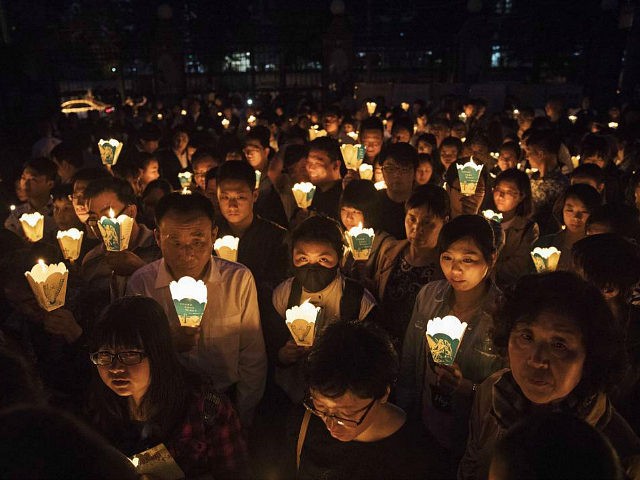The Chinese Foreign Ministry issued a fiery response to the U.S. State Department’s accusations of flagrant religious freedom violations in its latest report on Wednesday, insisting America “mind its own business” and “respect the facts.”
In addition to a stern condemnation from spokeswoman Hua Chunying, state-controlled media accused the United States of highlighting the oppression of Christians, Buddhists, Muslims, and Falun Gong practitioners in China to distract from the tense situation in Charlottesville, Virginia.
“We call on the United States to respect the facts, mind its own business, and stop using the religion issue to intervene in other countries’ internal affairs,” Hua told reporters following a question on the State Department’s annual report on global religious freedom. “China firmly opposes it, and has lodged serious representations to the United States on the issue.”
“The so-called U.S. report ignores the facts, confuses right and wrong and makes wanton criticism of China’s religious freedom situation,” she continued, adding, “everyone has seen that the facts prove the United States is not totally perfect.” Reuters notes that Hua did not specify what she meant by that or elaborate with examples of religious freedom violations in the United States.
The Chinese government also made its outrage known in Xinhua, arguably the most prominent of the many Chinese state media outlets. “While still reeling from the death and violence seen at a white-nationalist rally in the city of Charlottesville, the United States should take a minute to reflect on its own human rights situation before pointing accusing fingers at China,” a column in Xinhua Wednesday reads.
“As a matter of fact, Chinese people of all ethnic groups have enjoyed full religious freedom in accordance with the Constitution and state laws,” it continues, before admitting that the Chinese government does intimidate and suppress religious minorities that Beijing considers inconvenient to the cause of communism. “Some religious extremists, splittists and terrorists advocate violence within Chinese territory in the name of seeking religious freedom and human rights,” the article claims. “As a sovereign country, China has every right to maintain its social stability and territorial integrity by cracking down on those vicious groups.”
The article concludes that the Charlottesville incidents prove that the United States has no standing to highlight severe human rights violations in China, and that any attempt to accuse Beijing of discrimination against Buddhists and Uighur Muslims is “a claim distorting the truth in every way.”
The other two major Chinese media outlets, the Global Times and the People’s Daily, have not independently weighed in on the report. Instead, the Global Times has published a story lauding Beijing for its persecution of Tibetan Buddhists, titled “More Countries Shun Dalai Lama as China’s Economic Impact Grows.” Beijing has previously referred to the Dalai Lama as a dangerous separatist and Islamic State sympathizer.
“China uses tough measures against countries which allow the Dalai Lama to visit, including temporarily cutting off trade or aid, in addition to talks through diplomatic channels,” the story explains, celebrating a decision by the government of Botswana not to allow the Dalai Lama to visit.
In its annual religious freedom report released Tuesday, the State Department found that a wide variety of religious faiths struggle to avoid persecution in China. In particular, China prevents Christians from keeping a public profile, destroying thousands of church structures and removing crosses from town skylines throughout 2016. Those who resist the removal of Christian signs faced “detention, prosecution, or conviction.”
The report goes on to note that “only religious groups belonging to one of the five state-sanctioned ‘patriotic religious associations’ (Buddhist, Taoist, Muslim, Catholic, and Protestant) were permitted to register with the government and officially permitted to hold worship services.” The government closely monitors the content of sermons and public statements by these four churches, severely limiting their freedom to worship. Groups like the Falun Gong movement, which have no legal representation in Beijing, face near-total persecution.
Religious groups linked to certain Chinese ethnic minorities face unique discrimination, as well. In Xinjiang, Muslim Uighurs are legally banned from naming their children a host of traditional Muslim names and are required to place a GPS tracking device on their cars to ensure the government knows where they are at all times. Public observance of the Ramadan fast is prohibited, as is Islamic garb on public transportation.

COMMENTS
Please let us know if you're having issues with commenting.